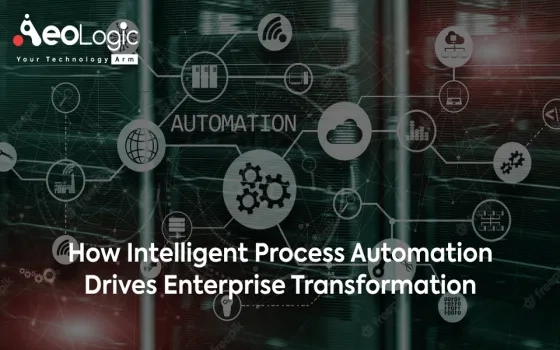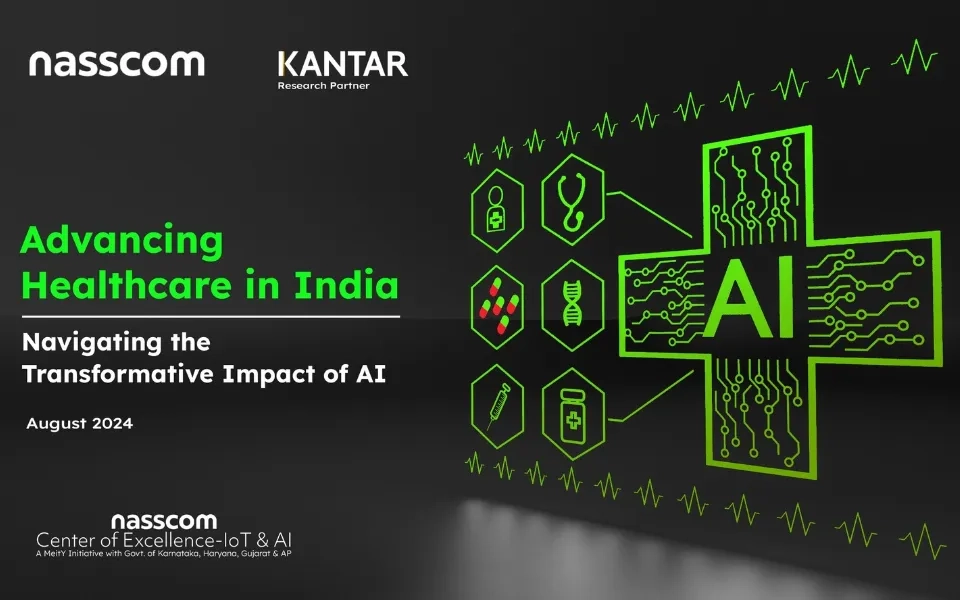Businesses are highly concentrated on enhancing productivity and effectiveness, avoiding functional pitfalls, and perfecting client experiences while keeping costs low in today's uncertain profitable situation. Intelligent process automation in enterprise transformation and RPA can help automate manual operations by removing repetitious, repeating, and regular procedures with intelligent BOTS.
Introduction
Indian businesses are recognising the immense eventuality of intelligent process automation in enterprise transformation to transfigure their operations and are spanning up their automation-related enterprise. By using intelligent automation technologies, organisations can streamline processes, boost productivity, optimise costs, and deliver exceptional experiences to workers, guests, and partners. To propel the digital transformation journey and seize openings presented by automation, it's pivotal to borrow best practices to completely work the eventuality of an intelligent automation platform. By doing this, we can uncover precious perceptivity and pave the way for successful business automation perpetration.
What's Intelligent Process Automation?
Precisely what's intelligent automation? Intelligent process automation in enterprise transformation is the practice of automating business processes using cutting-edge technology to ameliorate functional performance and cut charges. With the help of this technology, you can develop automated workflow processes that learn and acclimate to change using artificial intelligence technology. This software can handle orders for goods or services, invoicing, and other types of data, and it can also learn from how people bear.
Elements of Intelligent Process Automation
Three cognitive technologies make up intelligent process automation. Combining these elements produces a product that drives marketable and technological change without human intervention.
Artificial Intelligence
Occasionally known as AI, is an essential element of intelligent automation. Businesses can make a knowledge base and make prognostications using that data by assaying structured and unshaped data with machine learning and sophisticated algorithms.
This is the IA decision-making process.
Business Process Management (BPM)
Frequently known as business workflow automation, is the alternate aspect of intelligent automation. Workflows are automated as part of business process operation, which makes commercial processes more flexible and harmonious. Utmost sectors use business process operation to restructure operations, enhance dispatches, and boost participation.
Robotic Process Automation (RPA)
It makes up the third part of IA. In robotic process automation, software robots carry back- office operations like data birth and form stuffing, frequently known as bots. These bots work well with artificial intelligence since RPA can employ AI perceptivity to attack conditioning and use more complicated cases. Combining these three basics produces a transformative result that improves the client experience by streamlining workflows and processes.
How Intelligent Process Automation Works
To enhance RPA, intelligent process automation in enterprise transformation strives to integrate cognitive systems.
Optimized
Make it possible for client support by using a client. By using cutting-edge tools like chatbots, client service can be bettered.
Analytics and Perceptivity
Tools like process identification will make commercial processes more opportunistic and healthy.
The Benefits of Intelligent Process Automation and RPA
Aligning Automation Strategy With Business Objectives
To embark on a successful automation path, Indian organisations must align their strategy with their unique business objectives and challenges in the Indian environment. Intelligent process automation integrates people, processes, operations, and information to enable organisations to come as agile and accelerate their digital transformation enterprise.
Streamlining Processes and Embracing Automation
Streamlining and automating business processes pave the way for better data- driven decision-making, bettered employee productivity, and flawless access to work from anywhere, anytime. Still, numerous Indian organisations face challenges with automation enterprise due to multiple constraints owing to skills absence and limited IT resource allocation. To overcome these challenges, Indian businesses are taking charge, using user -friendly process automation platforms and creating connected, automated workflows with minimum IT involvement.
Driving Data-Driven Decision-Making
Indian businesses frequently grapple with penetrating critical information spread across multiple systems. Enterprise systems similar as Salesforce and SAP form the backbone of operations, yet information remains fractured and disconnected from business processes. With an agile and flexible process automation system, Indian organisations can integrate enterprise information, automating its inflow across business operations. This helps users work within their preferred operations while seamlessly penetrating applicable information from across the organisation. By bedding process automation into content services platforms, Indian businesses can work being enterprise information, connect content to workflows, and gain new perceptivity acclimatized to the unique Indian request.
Empowering Workers and Boosting Productivity
In the period of ultramodern work, Indian businesses strive for invention, productivity, and effective information operation. Still, mundane and repetitious tasks can hamper employee engagement leading to job dissatisfaction and dropped productivity. Automation technologies, similar as robotic process automation (RPA) empower Indian businesses to exclude repetitious tasks, enabling workers to concentrate on further precious and poignant work. By automatically surfacing applicable information at the right time, artificial intelligence (AI) and machine learning insure that workers have the necessary environment to make informed opinions and drive productivity in the Indian business geography.
Enabling Dynamic and Intelligent Case Operation
Case-grounded processes, similar as service requests and incident response, are complex and frequently ad hoc, especially in the unique Indian business terrain. Automation of case- grounded work enables Indian organisations to produce flexible and intelligent case operation systems, expediting acceptance and enhancing visibility for stakeholders. Integration of case operation, content services, and other enterprise operations provides knowledge workers in India easing their decision- making process, leading to rapid judgments .
Achieving Assiduity-Specific Use Cases
While the integration of AI machines into process automation platforms provides value, the true eventuality is realised when enforcing assiduity-specific use cases in the Indian environment. Aligning automation executions with defined data sets and standardised AI models accelerates success. Whether it's fraud identification in the financial services sector or preventative machine maintenance in manufacturing, every assiduity in India stands to profit from intelligent process automation. Packaged digital process automation operation feed to both assiduity-specific and vertical use cases. They offer pre-configured templates that enable businesses in India to digitise workflows, enhance information sharing, and gain practicable perceptivity. For example, an out-of-the-box grants operation result can empower government backing agencies and non-profits in India to efficiently manage finances, measure performance, and achieve better results.
Operations of Intelligent Process Automation
Intelligent process automation in enterprise transformation automates procedures that would else be labor- intensive, precious, and prone to human faults if performed manually or with legacy systems. IA has operations in different sector and improves productivity across the board.
Automotive
The advancements manufacturers may make by exercising intelligent automation significantly impact the automotive assiduity. The use of IA by manufacturers improves their capability to anticipate market shifts and modify affair consequently. Workflows in product, support, procurement, and other areas can be streamlined to ameliorate effectiveness and lower the possibility of error.
Robotics allows them to reduce the need for manual labor and increase problem identification, giving clients a better product at a reduced cost to the company. For case, to complete an exhausting physical step in the machine assembly process, the Volkswagen machine product installation in Germany employs cooperative robots that work with the product crew. Injuries are averted, procedures are expedited, delicacy is assured, and the physical strain on staff is reduced.
Life Sciences
The manufacture of medicines is nearly controlled and necessitates accurate product dimension and outfit estimation. It also necessitates an enormous volume of data gathering, assembly, processing, and analysis. With dependable analysis and issues, a drug study can be supposed successful. Manual styles could affect in calculation errors and bear a lot of time and labor. On the contrary, intelligent automation may produce automated procedures that increase product speed and quality, as demonstrated by the record- breaking product of Covid- 19 vaccinations. It used to take 40 scientists with doctorates 25 times or further to find a single marketable drug before using artificial intelligence and the edge that produced from it. Healthcare
With intelligent automation and natural language processing (NLP), the healthcare sector can offer a standardized system for data gathering, analysis, opinion, and treatment. Lower manual commerce is demanded; generally, a opinion can be made more rapidly when chatbots are used in remote medical sessions.
Aeologic Technologies to Help you Build: The Future of Intelligent Automation
There's a lot of guess regarding IA and the future of employment. The claim is that, while it may affect in position changes, job losses are not always the result. Blue- collar employment in manufacturing and agriculture came automated thanks to the Industrial Revolution. IA will also automate a lot of laborious and tedious white- collar occupations. So, we will not live in a dystopian society where robots run the world. IA results in advanced places, the invalidation of tiresome duties, and advancements to hand good.















